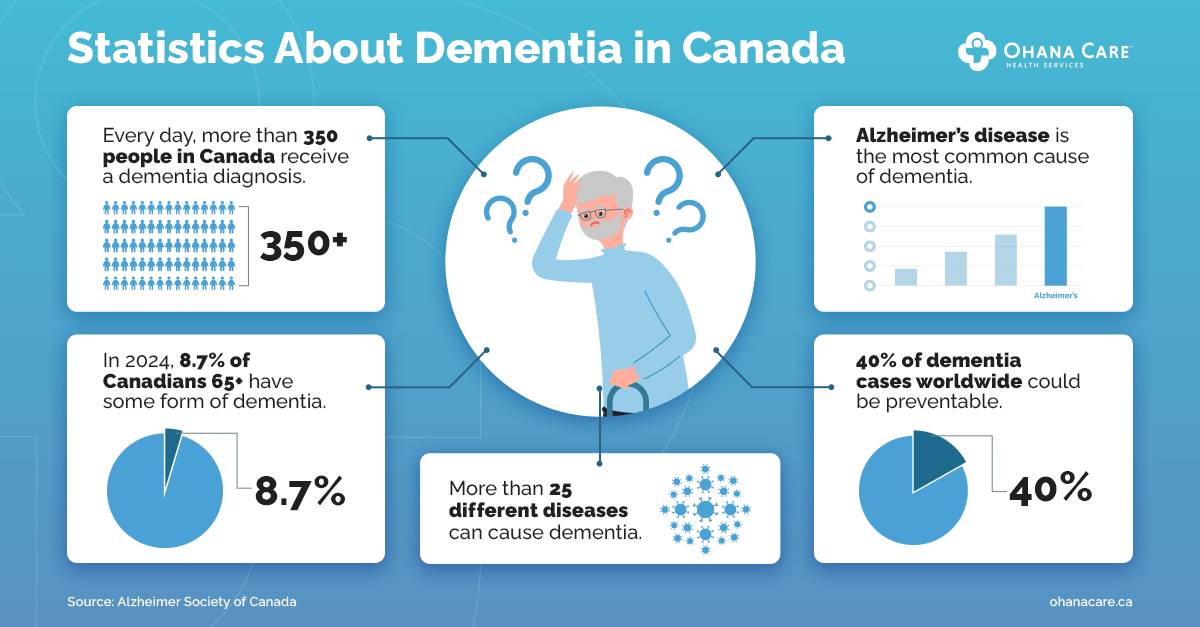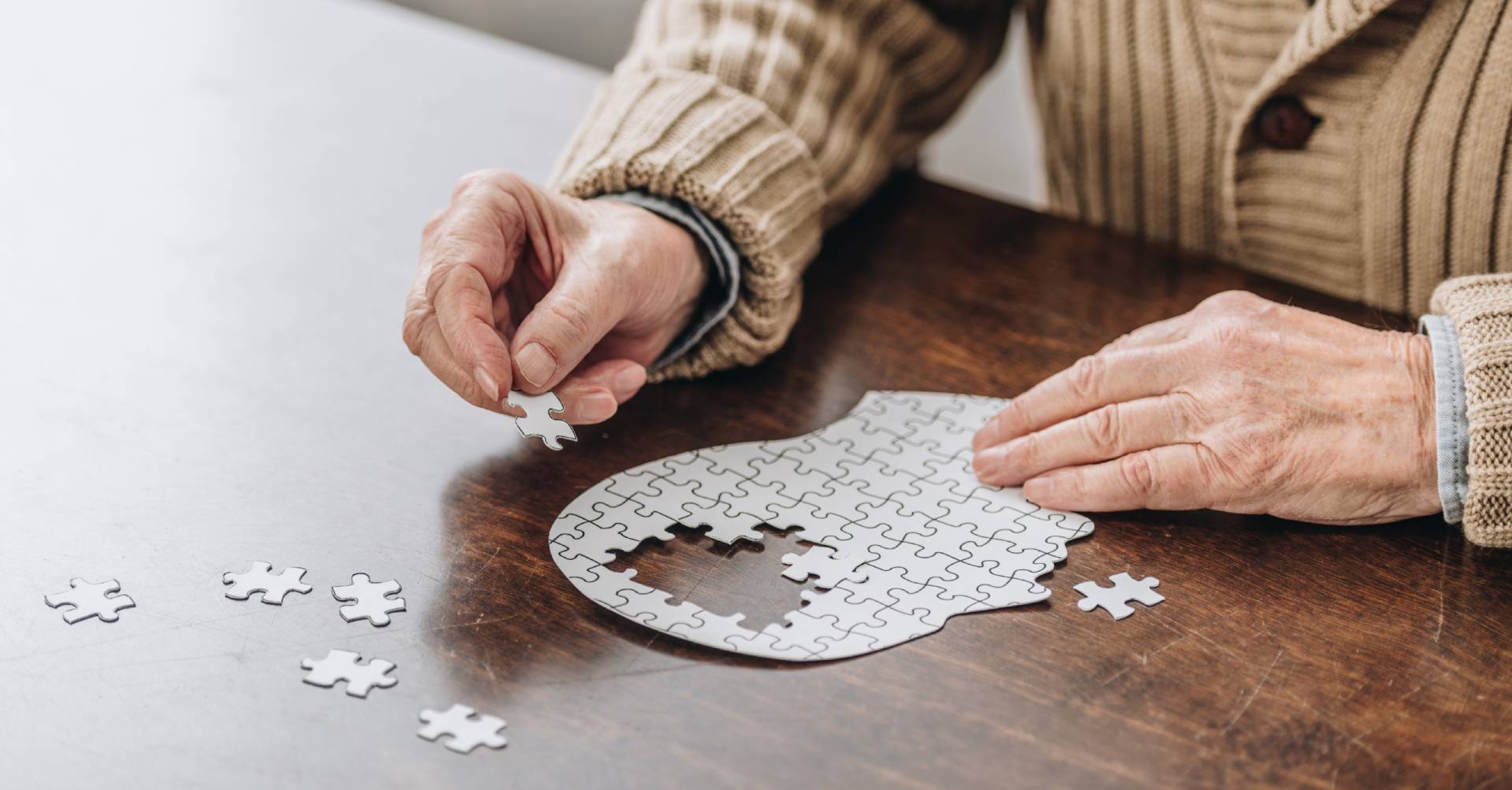As you watch your parents age, subtle changes in their behaviour, like times when they seem lost in their own home or have difficulty recalling information like their birthday, can make you feel worried or uncertain about the future.
You may wonder, are these normal aging behaviours or early symptoms and signs of dementia?
Unfortunately, dementia affects many Canadians and their loved ones. Here are some key stats about dementia in Canada:

In this blog post, we’re listing 11 behaviours that can be signs your loved one may have early-stage dementia. It’s important to recognize these warning signs of dementia early so you know what steps to take to ensure your elderly parents get the caregiving support they deserve.
1. Increased Naps
The Canadian 24-Hour Movement Guidelines for Adults recommend that seniors get 7 to 8 hours of good-quality sleep a night. In addition to this nightly sleep, having a 30—to 90-minute nap during the day has been shown to have brain benefits such as improved memory and enhanced cognitive function.
However, naps longer than an hour and a half or multiple naps a day can be a sign of underlying health conditions like Alzheimer’s or dementia.
Dementia affects the brain’s ability to regulate sleep patterns, which can lead to excessive daytime sleepiness. Sleep problems, like oversleeping, can also affect mood and overall well-being.
When you notice a family member mentioning they are taking more naps, it’s recommended to encourage them to seek appropriate medical advice from a family doctor.
2. Forgetfulness & Memory Loss
If your parent occasionally forgets appointments, misplaces keys every so often, or struggles to remember a name but recalls it later, that may be a typical sign of aging.
However, forgetfulness, which disrupts daily life, is one of the most common dementia symptoms and signs. The following are some specific examples of memory loss behaviours that should raise alarm bells:
- Struggling to find the right words
- Substituting unusual words in sentences
- Getting lost in familiar places
- Failing to follow simple directions
- Forgetting recent discussions or things that just happened
- Asking the same question despite receiving an answer moments before
- Missing important appointments, birthdays, or anniversaries that they would usually remember
- Forgetting to bathe, change clothes, or clean the house
If your parents are experiencing these types of memory problems, it may be time to consider a professional evaluation.
3. Repetitiveness
Dementia can cause individuals to become stuck in a loop as the brain struggles to form new memories and process information, leading to repetitive behaviours and conversations.
Being repetitive could manifest in various ways, such as:
- Repeating the same story within a short period
- Engaging in the same activity again and again
- Frequently asking the same question even after receiving an answer
- Performing the same physical movements
- Watching the same TV show or movie over and over
- Avoiding new activities or hobbies and sticking to familiar routines exclusively
4. Elopement
Have you heard from family members or noticed during visits that your parents leave the house unexpectedly, sometimes without dressing appropriately for the weather or forgetting how to find their way back?
This behaviour, known as elopement or wandering, is a dangerous sign associated with dementia.
According to the Alzheimer’s Association, 6 in 10 people living with dementia will wander at least once, but many do so frequently.
If your parent is exhibiting this type of behaviour, it’s crucial to address it immediately. Implementing safety measures, such as informing neighbours about their condition, can help prevent potential dangers.
5. Isolation
Is your parent becoming more withdrawn, avoiding social interactions, and spending increasing amounts of time alone?
This behaviour is often rooted in a struggle to keep up with conversations, remember names and faces, or follow the flow of social interactions.
If you aren’t sure if your loved one is isolating themselves, here are some specific dementia signs of social withdrawal to watch for:
- Reluctance to attend family events, community activities, or even small get-togethers with close friends
- Participating less in conversations, offering short responses, or seeming disinterested
- Losing touch with long-time friends, failing to return calls, or cancelling plans frequently
- Spending most of their time watching TV or engaging in activities that require little to no social interaction
Encouraging your parent to stay socially active and engaged is crucial to maintaining cognitive function, improving mood, and enhancing overall well-being.
6. Agitation
Agitation in those who you believe may have dementia can be both distressing and challenging to manage.
This behaviour goes beyond impatience or restlessness and often reflects deeper struggles with confusion, frustration, and anxiety. Agitation can manifest in various ways, such as:
- Pacing and wandering
- Verbal outbursts
- Physical aggression
- Repetitive movements
- Looking for a way out
- Humming or moaning
If your aging loved one is showing these dementia-like symptoms, it may be time to support them in getting an accurate diagnosis so you can help them work on some of their frustrations.
7. Changes in Language and Communication

Changes in language and communication are often early indicators of dementia as they can reflect a decline in cognitive functions.
The changes you may notice in your parents are that they struggle to find the right word, often pausing mid-sentence or using vague terms like “thing” or “stuff” instead of specific names and terms.
Additionally, they might substitute incorrect words, calling a watch a “hand clock” or a refrigerator a “cold box.”
8. Impaired Judgement
Impaired judgement is a common pattern of those with dementia. It often presents in ways that can significantly impact a person’s safety and well-being.
Here are some specific actions to watch for that may flag that your parents have impaired judgement due to dementia:
- Leaving the stove on
- Dressing inappropriately for the weather
- Falling victim to financial scams
- Giving away large sums of money or making unusual purchases
- Misjudging distances or ignoring traffic signals while driving
- Becoming easily confused on familiar routes
- Neglecting personal hygiene
- Failing to take medications as prescribed
- Ignoring signs of illness that need medical attention
9. Changes in Mood, Personality, and Behaviour
While dementia can commonly cause mental health issues like depression and anxiety, it also greatly affects the brain’s ability to regulate emotions and behaviour, leading to unpredictable mood swings and personality changes.
For example, your parent might develop a new obsession or paranoia about seemingly trivial matters, such as constantly checking if doors are locked or repeatedly accusing others of stealing their belongings.
On the other hand, some individuals with dementia might start painting or writing in ways they never did before, driven by changes in the brain that alter their perception and expression.
Additionally, as dementia progresses, emotional blunting, where your parent shows a lack of empathy or emotional response to situations that would normally elicit strong feelings, can be a sign. This emotional change can be particularly distressing as it may seem as though they no longer care about their loved ones or their surroundings.
10. Loss of Initiative
Does your parent, once vibrant and engaged, now sit quietly, disinterested in the activities they once loved? No longer call friends for a chat, attend social gatherings, or participate in family dinners with the same enthusiasm? If so, this is a noticeable loss of initiative and can be a sign of dementia.
As they withdraw from social interactions and activities, they can become more isolated, which can contribute to cognitive deterioration.
The decline in initiative creates a cycle where the lack of stimulation leads to more significant cognitive challenges, making it even harder for them to re-engage with everyday life.
11. Challenges With Problem Solving
If your parent starts struggling with tasks that were once second nature, such as managing finances or following a favourite recipe, it can be a telling sign of dementia.
Difficulty operating household appliances, remembering the routine of getting ready in the morning, or struggling to plan or organize activities can lead to unfinished tasks and a general sense of frustration.
If your parent is having trouble thinking things through and solving everyday problems, it can indicate a deeper cognitive decline that requires attention and support.
Get In-Home Dementia Support With Ohana Care

Although you may not be by your parent’s side daily, if you have an inkling that your loved one is showing signs of dementia, it can be worth consulting other family members, their neighbours, or another person living with them to see if they are exhibiting any of the above symptoms or behaviours.
Should your loved one become diagnosed with dementia, lean on Ohana Care for in-home caregiving support.
Our in-home dementia support can help you and your loved ones manage these symptoms and improve your parent’s quality of life. Our compassionate caregivers are trained to provide the best possible care for seniors with dementia, ensuring they receive the support they need while remaining in the comfort of their own home.
Not only can we provide support with daily tasks such as meal preparation, ensuring medication is taken on time, and assisting with personal hygiene, we can also provide companionship.
Our companionship support can help prevent feelings of isolation and loneliness to ensure your parents continue to live a healthy and happy lifestyle while keeping them safe and preserving their independence as much as possible.
Let us help take some stress off of your plate and provide your parents with the compassionate care they deserve.
Contact Ohana Care today to learn more about our in-home dementia support services and how we can assist you throughout this challenging time.




